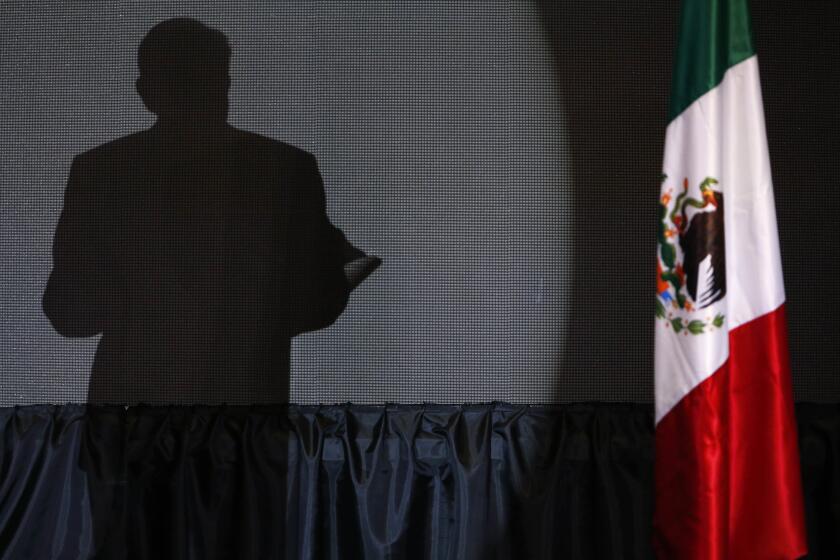President’s Struggle Is Part of Battle for Venezuela’s Future
One week into a general strike that has rocked this nation, President Hugo Chavez is again in a fight for his political life.
Eight months ago, Chavez’s often chaotic pursuit of a plan to improve the lives of millions of Venezuela’s poor led to a coup that ousted him for 48 hours.
Then, his foes were relying on the country’s military to get rid of Chavez, but he was restored by loyal troops. Now, his opponents are relying on the country’s second most powerful force: the oil industry.
Striking oil workers -- from dockworkers to top executives -- have crippled the state oil company, PDVSA, the nation’s most important business and the third-largest supplier of petroleum to the United States.
By shutting down key parts of the production chain, PDVSA workers have managed to freeze oil exports, slash the availability of gasoline and thrust the country to the point of political crisis.
Rather than fold, however, the combative ex-paratrooper Chavez has chosen to fight -- in a battle that could profoundly affect the ongoing struggle over the future of Venezuela.
“We are going to confront them, and we are going to defeat them,” Chavez said of the striking workers during a five-hour stemwinder Sunday on his weekly television and radio show. “No matter what happens, we are going to defeat them.”
But it was obvious just how difficult the battle promises to be.
Chavez spent a fourth day in an unsuccessful attempt to replace the striking crew of a tanker anchored in Lake Maracaibo in northwestern Venezuela, a ship holding 280,000 barrels of gasoline, or enough to fill domestic needs for a day.
He threatened during his speech to begin firing disobedient PDVSA employees, characterizing their work as a “public service.” He said he had the right to take over private gasoline delivery companies and was also making plans to replace the company’s board of directors, all of whom had offered to resign.
Chavez also sent national guard soldiers to gas stations throughout Caracas, the capital, as long lines of cars backed up in search of fuel. Many stations were closed, and those still open were unsure how much longer supplies would last.
There were some small signs of hope Sunday. A source close to negotiations between Chavez and his opponents said the two sides had agreed to formal talks today that would include discussion of an “electoral packet.”
Opponents have sought a nonbinding February referendum on Chavez’s rule, which the president has opposed by insisting that the constitution would allow only a binding vote in August, halfway through his term. Now, after three people were killed at a protest Friday night, the opposition has hardened its demands and wants his resignation and new elections.
The discussions will include everything from the referendum to a constitutional amendment that would permit early elections, the source said.
Meanwhile, if the battle over control of the state’s oil production proves difficult, it is also crucial if Chavez is going to be able to carry out his “Bolivarian revolution,” named for the famous 19th century liberator of South America, Simon Bolivar.
Since he swept into office in December 1998, Chavez has pursued an almost messianic vision to reshape Venezuela, a country whose oil riches have not reached most of its 24 million people, 80% of whom live in poverty.
His overwhelming popularity, after decades of rule by deeply corrupted traditional political parties, allowed him almost total control. He created a new constitution, a new assembly and a new judicial system.
Using special powers granted him by the assembly, he passed a series of laws last year that raised the ire of powerful sectors throughout society. One allowed the forced sale of idle land for redistribution to the poor. A second mandated that the state control a majority of the shares in new oil exploration.
Like other Latin American reformers, such as Chilean President Salvador Allende, a socialist who nationalized industries to improve the lives of the poor, Chavez awoke resentment among the elite, long used to running Venezuela through political and family alliances.
But unlike Allende, whose overthrow by a CIA-backed coup in 1973 came in the midst of the Cold War, Chavez also has managed to alienate people from the left and the poor.
The controversial laws -- passed without debate in the democratically elected assembly -- catalyzed groups normally at odds to join forces against the maverick president.
The nation’s largest business grouping, Fedecamaras, grew apoplectic over the new laws, which it saw as anti-business. Leaders of the country’s largest labor union, the Confederation of Venezuelan Workers, grew angry after Chavez launched a long and ultimately unsuccessful battle to install a close ally as its president.
Military officers and the conservative Roman Catholic Church became uncomfortable with Chavez’s growing flirtation with leftist ideology, as he improved ties with Cuba and his close friend Fidel Castro.
Venezuela’s largest media outlets also turned on Chavez, blaming his aggressive complaints about their critical editorials and coverage for a series of attacks by Chavez supporters -- including a bombing.
And, finally, even many in the middle class turned against Chavez as oil prices dropped and the economy soured.
Most recent polls show Chavez with about 25% to 30% support -- most of it among the poor, who see in him someone who has at least shown some interest in improving their lives.
“I want to tell the truth to all Americans: This is the real Venezuela,” said Reimundo Palma, a gay rights activist marching in a sea of Chavez supporters Saturday. “There are hundreds of thousands of people supporting our president.... He’s going to be here forever.”
More to Read
Sign up for Essential California
The most important California stories and recommendations in your inbox every morning.
You may occasionally receive promotional content from the Los Angeles Times.










